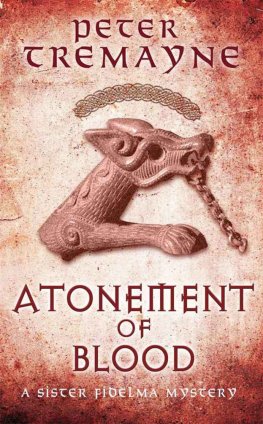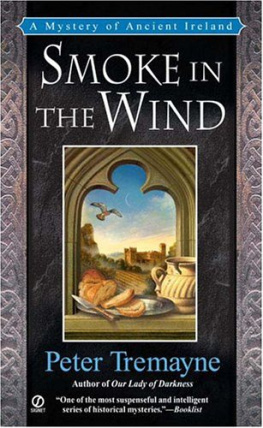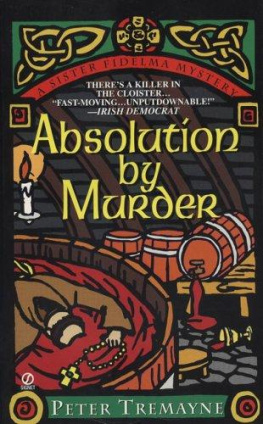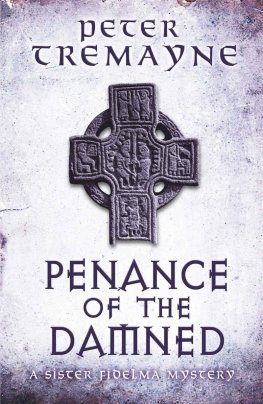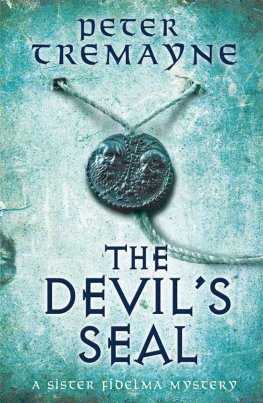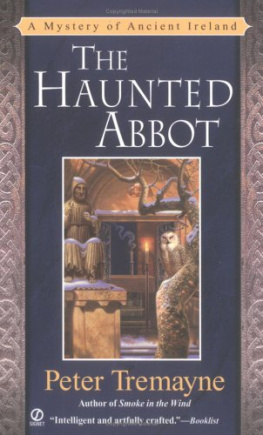Peter Tremayne - Atonement of Blood
Here you can read online Peter Tremayne - Atonement of Blood full text of the book (entire story) in english for free. Download pdf and epub, get meaning, cover and reviews about this ebook. year: 2013, publisher: Minotaur Books, genre: Detective and thriller. Description of the work, (preface) as well as reviews are available. Best literature library LitArk.com created for fans of good reading and offers a wide selection of genres:
Romance novel
Science fiction
Adventure
Detective
Science
History
Home and family
Prose
Art
Politics
Computer
Non-fiction
Religion
Business
Children
Humor
Choose a favorite category and find really read worthwhile books. Enjoy immersion in the world of imagination, feel the emotions of the characters or learn something new for yourself, make an fascinating discovery.
- Book:Atonement of Blood
- Author:
- Publisher:Minotaur Books
- Genre:
- Year:2013
- ISBN:9781250046000
- Rating:4 / 5
- Favourites:Add to favourites
- Your mark:
- 80
- 1
- 2
- 3
- 4
- 5
Atonement of Blood: summary, description and annotation
We offer to read an annotation, description, summary or preface (depends on what the author of the book "Atonement of Blood" wrote himself). If you haven't found the necessary information about the book — write in the comments, we will try to find it.
Atonement of Blood — read online for free the complete book (whole text) full work
Below is the text of the book, divided by pages. System saving the place of the last page read, allows you to conveniently read the book "Atonement of Blood" online for free, without having to search again every time where you left off. Put a bookmark, and you can go to the page where you finished reading at any time.
Font size:
Interval:
Bookmark:
Peter Tremayne
Atonement of Blood
Quia anima carnis in sanguine est et ego dedi illum vobis ut super altare in eo expietis pro animabus vestris et sanguis pro animae piaculo sit.
For the life of the flesh is in the blood; and I have given it to you upon the altar to make an atonement for your souls, for it is the blood that maketh an atonement for the soul.
Leviticus 17:11, Vulgate Latin translation of Jerome 4th centuryCHAPTER ONE
Eadulf was staring moodily out of the window at the darkening sky above the fortress of Cashel, the stronghold of Colg, King of Muman. The Kingdom of Muman was the largest and most south-westerly of the Five Kingdoms of ireann. The air was chill, and all day grey stormclouds had raced across the sky; low and intense, driven by strong and angry winds.
It will snow before long, he observed, turning to where his companion was seated before a mirror, putting the final touches to the position of a silver circlet which crowned her red-gold hair.
Rain is more likely, Fidelma replied, continuing to concentrate on her reflection. It is not quite cold enough for snow.
Its cold enough for me, Eadulf muttered with a shiver as he left the window and crossed to where a wood fire was crackling in the hearth. At least, whatever arrives, it should come and go quickly, for the clouds are moving fast with this westerly wind.
It is the month of Cet Gaimrid, the start of winter, Fidelma pointed out, rising from her seat. What do you expect but cold weather? She turned again to regard herself critically in the mirror. Now, tell me truthfully, how do I look? She moved her head from side to side in order for him to inspect her.
Eadulf smiled softly. Even more beautiful than the first time I saw you.
Fidelma pulled a face at him in mock disapproval but she was not displeased with his response. Having finally left the religious, casting aside the robes of brown woollen homespun, she had now donned the clothes that revealed her as a Princess of the Eghanacht. Eadulf knew that she only put on such fine clothes when there was an important occasion to be observed; this night was such an occasion.
There was a gentle tap on the door, and in response to Fidelmas invitation it opened to admit a middle-aged woman of ample proportions with greying, untidy hair. Judging from her weathered skin, she was more used to the open air than the enclosure of the palace. She was dressed in comfortable homespun. Clutching her hand was a young child, about three years of age, with a mop of bright red hair and features that resembled Fidelmas.
I thought you would like to say good night to your little one before you go to the feast, lady, the nurse, Muirgen, announced.
Fidelma immediately dropped into a crouch and held out her arms.
The boy ran forward to hug his mother. Then he pulled away from her with an anxious frown. Muimme says you are going to a feast. Are you going away for a long time? When will you come back?
Fidelma laughed easily and hugged her son again. We are only going down into the great hall, Alch. You know where that is. We shall be back after our meal.
Eadulf tried to conceal the emotion he felt. During the first three years of little Alchs life it seemed that they had barely spent any time with the boy. They were always travelling on some errand, either on behalf of Fidelmas brother, the King, or on behalf of the clergy. Eadulf had seen what effect it had on the child, and he felt that it was time they settled into a more stable way of life. Their son was always nervous when there was any hint of them leaving. Eadulfs one abiding image of Alch was of the boy, standing in the cobbled courtyard, clutching at his nurses hand and trying not to give way to tears as he watched them ride out from Cashel.
We are not going anywhere, Alch, he declared firmly, scooping the little lad in his arms and giving him a mock throw into the air.
The boy chuckled as he came down and clung to his fathers shoulder, his blue-green eyes gleaming.
Take me riding tomorrow, athair? he asked.
Ill take you, little hound, said Fidelma, giving the literal meaning of his name.
Well both take you, Eadulf promised, and set him down. Fidelma raised an eyebrow and smiled slightly, for she knew that Eadulf was not a natural horseman like she was and preferred to walk rather than ride. Now you run off to bed like a good boy. Well look in on our way back from the feast and well expect you to be asleep.
Goodnight, mathair, goodnight, athair, the boy said solemnly. Then he turned to his nurse with a skip. I am going riding tomorrow, muimme! he shouted.
The elderly woman reached out a hand to take his. She acknowledged Fidelma and Eadulf with a quick nod before leading the boy from the room.
For a moment or two, Eadulf stared at the closed door. One thing he could never get used to in this adopted language of his was the fact that he and Fidelma were addressed by the formal athair and mathair, Mother and Father, while the intimate forms of muimme and aite, Mummy and Daddy, were reserved for foster-parents. He had heard the explanation many times but could never really understand it.
The clan society of the Five Kingdoms was also based on a fosterage system. When boys and girls reached the age of seven years old, they were sent away for their education in what was known as fosterage. It was practised by persons of all classes, but especially by nobles. Nobles fostered other nobles children; kings fostered other kings and nobles children. There were two kinds of fosterage for affection or for payment. Among the nobles it was usually for affection. In this manner, the closest of ties were developed between the ruling families and the relationship was regarded as a sacred bond, as if it was a blood tie. In such a deeply based kin-society it was a sure way of preventing conflict and warfare.
In many ways, Eadulf felt it was a laudable system. It was just that the closeness of the fosterage system seemed to have caused a change in language whereby the blood parents were addressed in formal terms while the foster-parents were addressed in intimate terms.
What are you thinking about? Fidelmas voice cut into his thoughts.
Eadulf turned and gave her a quick smile. I was wondering what the reason was for this special feast that your brother has called for this evening?
It is held in memory of a great poet and churchman of our people who died seventy years ago, she replied. His name was Colmn mac Lnine.
And are his poems worthy of such a celebration?
Some would appear to think so, she said. He was acclaimed as the royal poet of Muman. However, it is his services to the Faith that the abbots and bishops of Muman feel should be celebrated. He left the service of the King of Cashel and decided to travel through the kingdom preaching the New Faith. He finally established his own abbey at Cluain Uamha.
The meadow of the cave? translated Eadulf. Isnt that an abbey to the south-west of here?
Your knowledge is very good.
So I suppose Abbot Sgdae of Imleach will be attending this feast?
No. The Feast of Colmn keeps him in Imleach. One of Colmns achievements was to find the lost shrine of the Blessed Ailbe of Imleach, who brought the Faith to our kingdom. The ancients who buried Ailbe had kept his shrine a secret for fear it would be molested. The time came when no one left alive knew the secret. It was Colmn who solved the mystery and so he is blessed at Imleach and remembered there each year accordingly.
Eadulf wondered aloud, So does tonights feast commemorate the religieux or the poet?
This feast celebrates the whole man, Fidelma replied.
The chamber was suddenly lit by a flash of white light, followed within a split second by a crash of thunder. The echo rumbled in the distance, then died away. There was a moment of silence, then a sound like pebbles being scattered on stone. They could see the urgent flurry of lumps of water-ice landing on the window-ledge. Eadulf peered out, through the hailstones, to the dim outline of the town below. A moment later, the hail gave way to heavy rain.
Font size:
Interval:
Bookmark:
Similar books «Atonement of Blood»
Look at similar books to Atonement of Blood. We have selected literature similar in name and meaning in the hope of providing readers with more options to find new, interesting, not yet read works.
Discussion, reviews of the book Atonement of Blood and just readers' own opinions. Leave your comments, write what you think about the work, its meaning or the main characters. Specify what exactly you liked and what you didn't like, and why you think so.

